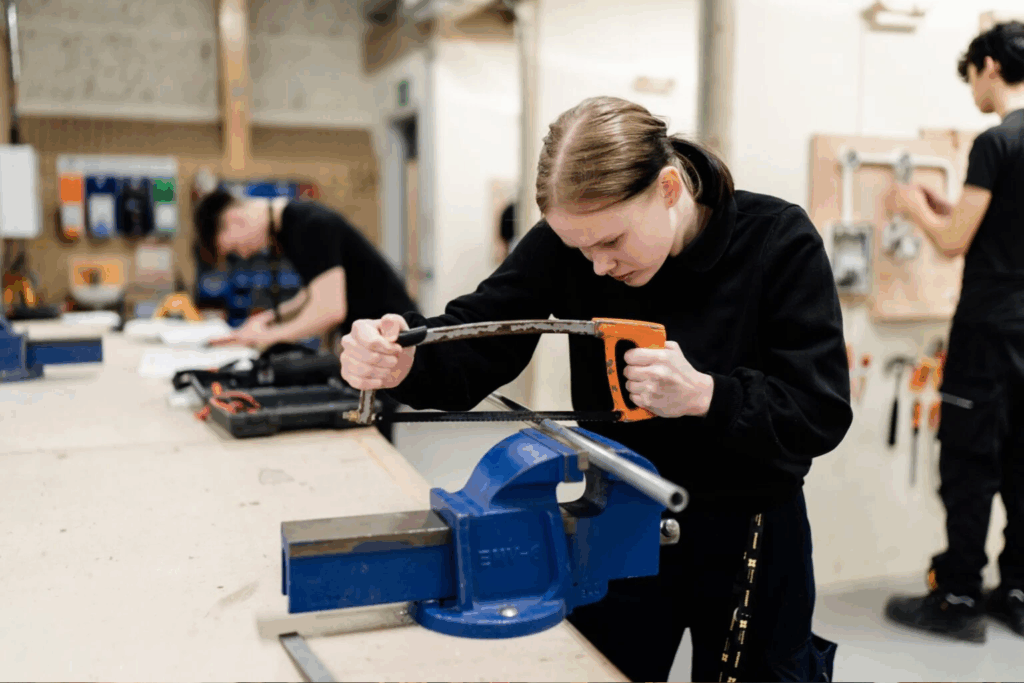Full-time applications for September 2026 will be opening soon, please check back for further updates.
What can this course lead to?
Upon successful completion of the T Level Building Services Engineering – Electrical Installation programme, you will be well-equipped for a variety of career paths, including:
- Electrician: Pursue a career as a certified electrician, working in various settings such as residential, commercial, or industrial.
- Building Services Engineer: Specialise in electrical systems within the broader field of building services engineering.
- Sustainability Consultant: Advice on energy-efficient electrical solutions and green technologies.
- Electrical Inspector: Ensure compliance with electrical codes and regulations in construction projects.
- Further Education: Choose to pursue higher education or specialised training in electrical engineering or related fields.
Who is it for?
This T Level is designed for those who want to develop an understanding of electrotechnical engineering within the building services industry. You will gain comprehensive knowledge and practical skills essential for a successful career in electrical installation within building services engineering.
This two-year course focuses on electrical systems, wiring and their integration into modern building infrastructure. T Levels aim to provide the knowledge and experience needed to open the door to highly skilled employment, higher level study or a Higher Apprenticeship.
The course is delivered through workshop-based practical sessions, classroom learning and work experience placements in your second year.
You’ll have access to guest speakers and industry experts, site visits, relevant field trips and industry placements on live sites out in the world of work. There is also an employer-set project, which you will complete as part of a team. If you are not quite ready for a T Level, then a foundation programme could give you the chance to improve your maths and English (and any other subjects you need to improve) to move on to a T Level the following year.
What is covered?
- Electrical Systems: Develop expertise in electrical systems, from basic wiring to advanced circuitry used in residential, commercial, and industrial settings. #
- Health and Safety: Emphasise the importance of electrical safety, codes, and regulations to create secure working environments.
- Sustainable Practices: Explore energy-efficient and sustainable electrical installation techniques in alignment with contemporary industry standards.
- Technical Proficiency: Gain hands-on experience with electrical tools and equipment, ensuring competence in installation, maintenance, and troubleshooting.
- Problem Solving: Cultivate problem-solving skills to efficiently diagnose and rectify electrical issues.
- Building Integration: Understand how electrical systems are integrated into broader building services engineering, including heating, ventilation, and plumbing.
- Course Content : Introduction to Electrical Installation: Cover the fundamentals of electrical systems, components, and safety procedures.
- Wiring and Circuitry: Explore electrical circuit design, installation, and maintenance for various applications.
- Electrical Codes and Regulations: Understand building codes and electrical installation industry standards.
- Energy-Efficient Technologies: Focus on energy-efficient lighting, renewable energy sources, and sustainable electrical practices.
- Safety in Electrical Work: Learn and apply safety protocols for electrical installation and maintenance.
- Building Services Integration: Study how electrical systems interact with other building services engineering components.
- Work-Based Learning: Apply theoretical knowledge and practical skills through an industry placement, gaining real-world experience.
Frequently Asked Questions (FAQs)
4 GCSEs at grades 4/C or above including English and Maths (or Functional Skills at Level 2) and grade 4/C or above in either a science or design technology-based subject. Students who have achieved a Level 2 Diploma in Electrical will be considered for this T Level if they have achieved Maths and English at grade 4/C or above. You must demonstrate a minimum of 90% attendance at your last place of work or study.
To monitor your practical knowledge and skills, the course includes regular tasks and assignments. There are also several formal assessments during the two years: external exams, controlled assessments, practical summary assignments and an employer-led set project.
You’ll be assessed through two examination papers: Paper 1 (Science and Building Technology) and Paper 2 (Construction Industry and Sustainability). You must also complete an employer-set project.
There is also a single synoptic assessment for the Electrotechnical Engineering Occupational Specialist Component, an extended ‘design, development and implementation’ project. You will spend dedicated time in class with industry experts who will deliver and assess bespoke modules that address critical skills gaps identified by the industry.
All learners must spend a minimum of 45 days on a mandatory industry placement.
It’s really important to understand that successful completion of your Industry Placement hours is a mandatory requirement for passing your T Level course. This placement is not just an add-on; it’s an integral part of your learning journey and is essential for demonstrating the skills and knowledge you’ve gained.
Therefore, please be aware that if the required Industry Placement hours are not completed, you will not achieve your T Level qualification.
We’re here to support you in finding and succeeding in your placement, so please don’t hesitate to reach out to our dedicated Work Experience Team if you have any questions or need guidance.
Start date: 01/09/2026
STL3EL5AF$
2 Years
Full-time courses are fully funded for 16 to 18-year-olds. For age 19+, various funding options are available.
Part of the Inspire Education Group © 2025 All rights reserved.
